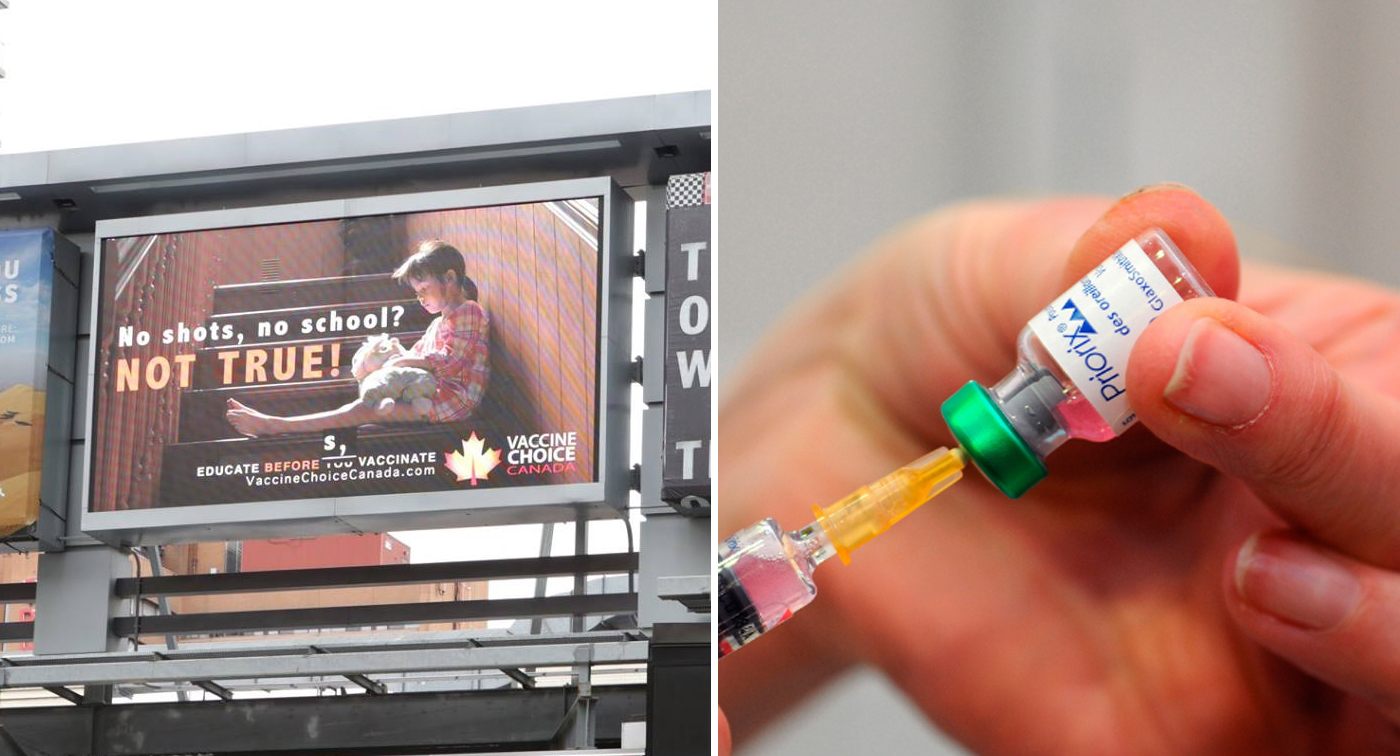Anti-Vaccine Group’s Billboard Blitz in Toronto Just Got Cut Short

Credit to Author: Rachel Browne| Date: Wed, 27 Feb 2019 17:52:42 +0000
This story has been updated following the announcement of the removal of the billboard ads
A billboard campaign blitz by an anti-vaccine group in Toronto was cut short on Wednesday following outcry over its messages that questioned vaccine science and the idea that children need to be vaccinated in order to attend school.
The billboard ads will be taken down, following a Toronto City Council meeting where councillors condemned the billboards as “dangerous.”
Councillor Joe Cressy thanked the billboard company on Twitter for pulling the ads.
Vaccine Choice Canada had purchased space on 50 digital billboards across the Greater Toronto Area with four rotating messages that were expected to achieve two million impressions, according to The Globe and Mail . The billboards were unveiled last week and are expected to run until next week.
On its website, the group says it was formed in response to “growing public concern about vaccine safety.”
“No shots, no school? Not true!” states one billboard near the Eaton Centre Mall at one of the city’s busiest intersections. “Educate before you vaccinate,” says another.
Following the announcement that the billboard ads would be removed, Vaccine Choice Canada vice-president Ted Kuntz said the campaign had nonetheless been successful. “We got a week of viewing which was about a million hits,” he wrote on his Facebook page. “A huge thank you to everyone who helped to make this possible.”
The billboards prompted concern from Toronto Public Health, which is warning against false messaging and “half-truths.”
“There is legislation available to prevent tobacco companies from advertising,” Vinita Dubey, a medical officer with the department, told The Globe. “There is some precedent for being more legislative and proactive about messaging.”
In response to more than a dozen confirmed recent cases of measles in the BC, the province’s health minister Adrian Dix announced this week a plan to mandate parents to register their children’s vaccine records in both the public and private systems by this fall. On Wednesday, Dix said that requests for measles vaccinations have soared because of the outbreak.
Measles is a highly contagious disease caught by a virus typically passed through the air or direct physical contact. Initial symptoms usually include a high fever, followed by a rash on the neck and face that can spread to the hands and feet. The rate of measles, once a common disease among children, greatly declined after the introduction of the measles vaccine in the 1960s.
By law, students in Ontario must prove they’ve been vaccinated against measles, mumps and rubella in order to attend classes, unless parents have received an exemption for religious or conscientious reasons.
Kuntz told VICE in an email on Wednesday he would respond within 48 hours only to written questions because “this is the best way to ensure that our message is reported accurately and with integrity.” Kuntz then pointed to the group’s website.
Kuntz took to his Facebook page on Wednesday morning to lament the characterization of his group and its billboard messages as “anti-vaccine.”
“Unfortunately, the mainstream media can’t tell the difference between “anti-vaccine” and “vaccine risk aware,” wrote Kuntz. “In their view, vaccines are sacred and anyone who questions vaccine safety, effectiveness or necessity is against vaccines. These are the same people who purport to be advocates of science.”
The World Health Organization describes “vaccine hesitancy,” defined as delaying or refusing to get immunized despite scientific evidence, as “a complex global problem that requires ongoing monitoring.”
Earlier this month, a BC father at the centre of the measles outbreak told CBC News he declined to vaccinate his three children years ago because he and his wife at the time were swayed by reports that vaccines were linked with autism—even though there is no science to back this up. Emmanuel Bilodeau said he believes one of his sons became infected with measles earlier this year during a trip to Vietnam, and his other sons soon started showing symptoms. Bilodeau says he now knows reports of a link between vaccines and autism has been debunked.
In January, Washington state declared a public health emergency over at least 54 cases of measles, the worst outbreak in more than 20 years. State legislatures in Washington, and a handful of other U.S. stands, are introducing measures to prevent parents from obtaining vaccine exemptions based on religious or personal reasons.
Follow Rachel on Twitter.